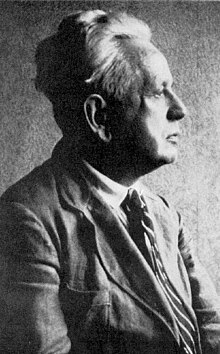Ernst Alfred Cassirer | |
|---|---|
 Cassirer in about 1935 | |
| Born | Ernst Alfred Cassirer July 28, 1874 |
| Died | April 13, 1945 (aged 70) New York City, U.S. |
| Education | University of Marburg (PhD, 1899) University of Berlin (Dr. phil. habil., 1906) |
| Era | 20th-century philosophy |
| Region | Western philosophy |
| School | Neo-Kantianism (Marburg School) Phenomenology |
| Theses |
|
| Academic advisors | Hermann Cohen Paul Natorp |
Main interests | Epistemology, aesthetics |
Notable ideas | Philosophy of symbolic forms Animal symbolicum |
Ernst Alfred Cassirer (/kɑːˈsɪərər, kəˈ-/ kah-SEER-ər, kə-;[1] German: [ˈɛʁnst kaˈsiːʁɐ];[2][3] July 28, 1874 – April 13, 1945) was a German philosopher. Trained within the Neo-Kantian Marburg School, he initially followed his mentor Hermann Cohen in attempting to supply an idealistic philosophy of science.
After Cohen's death in 1918, Cassirer developed a theory of symbolism and used it to expand phenomenology of knowledge into a more general philosophy of culture. Cassirer was one of the leading 20th-century advocates of philosophical idealism. His most famous work is the Philosophy of Symbolic Forms (1923–1929).
Though his work received a mixed reception shortly after his death, more recent scholarship has remarked upon Cassirer's role as a strident defender of the moral idealism of the Enlightenment era and the cause of liberal democracy at a time when the rise of fascism had made such advocacy unfashionable. Within the international Jewish community, Cassirer's work has additionally been seen as part of a long tradition of thought on ethical philosophy.[4]
- ^ "Cassirer". Random House Webster's Unabridged Dictionary.
- ^ "Duden | Ernst | Rechtschreibung, Bedeutung, Definition". Duden (in German). Retrieved 20 October 2018.
Ẹrnst
- ^ "Duden | Cassirer | Rechtschreibung, Bedeutung, Definition". Duden (in German). Retrieved 20 October 2018.
Cassirer
- ^ Gordon, Peter E. (8 September 2009). "(Book 1) Ernst Cassirer: The Last Philosopher of Culture; (Book 2) The Symbolic Construction of Reality: The Legacy of Ernst Cassirer". Notre Dame Philosophical Reviews. Retrieved April 13, 2020.